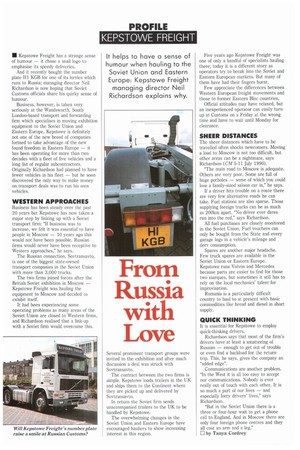From Russia with ve
Page 40

If you've noticed an error in this article please click here to report it so we can fix it.
• Kepstowe Freight has a strange sense of humour — it chose a snail logo to emphasise its speedy deliveries.
And it recently bought the number plate HI KGB for one of its lorries which runs to Russia; managing director Neil Richardson is now hoping that Soviet Customs officials share his quirky sense of humour.
Business, however, is taken very seriously at the Wandsworth, South London-based transport and forwarding firm which specialises in moving exhibition equipment to the Soviet Union and Eastern Europe. Kepstowe is definitely not one of the new breed of companies formed to take advantage of the new found freedom in Eastern Europe — it has been operating for more than two decades with a fleet of five vehicles and a long list of regular subcontractors. Originally Richardson had planned to have fewer vehicles in his fleet — but he soon discovered the only way to make money on transport deals was to run his own vehicles.
WESTERN APPROACHES
Business has been steady over the past 20 years but Kepstowe has now taken a major step by linking up with a Soviet transport firm: If business was to increase, we felt it was essential to have people in Moscow — 10 years ago this would not have been possible. Russian firms would never have been receptive to Western approaches," he says.
The Russian connection, Sovtransavto, is one of the biggest state-owned transport companies in the Soviet Union with more than 3,000 trucks.
The two firms joined forces after the British Soviet exhibition in Moscow — Kepstowe Freight was hauling the equipment to Moscow and decided to exhibit itself.
It had been experiencing some operating problems as many areas of the Soviet Union are closed to Western firms, and Richardson realised that a link-up with a Soviet firm would overcome this. Several prominent transport groups were invited to the exhibition and after much discussion a deal was struck with Sovtransavto.
The contract between the two firms is simple. Kepstowe loads trailers in the UK and ships them to the Continent where they are picked up and delivered by Sovtransavto.
In return the Soviet firm sends unaccompanied trailers to the UK to be handled by Kepstowe.
The overwhelming changes in the Soviet Union and Eastern Europe have encouraged hauliers to show increasing interest in this region. Five years ago Kepstowe Freight was one of only a handful of specialists hauling there; today it is a different story as operators try to break into the Soviet and Eastern European markets. But many of them have had their fingers burnt.
Few appreciate the differences between Western European freight movements and those to former Eastern Bloc countries.
Official attitudes may have relaxed, but an inexperienced operator can easily turn up at Customs on a Friday at the wrong time and have to wait until Monday for clearance.
SNEER DISTANCES
The sheer distances which have to be travelled often shocks newcomers. Moving a load to Moscow is not too difficult, but other areas can be a nightmare, says Richardson (CM 5-11 July 1990).
"The main road to Moscowis adequate. Others are very poor. Some are full of huge potholes — some of which you could lose a family-sized saloon car in," he says.
If a driver hits trouble on a route there are very few alternative roads he can take. Fuel stations are also sparse. Those supplying foreign trucks can be as much as 200km apart. "No driver ever dares run into the red," says Richardson.
All fuel purchases are closely monitored in the Soviet Union. Fuel vouchers can only be bought from the State and every garage logs in a vehicle's mileage and dery consumption.
Spares are another major headache. Few truck spares are available in the Soviet Union or Eastern Europe. Kepstowe runs Volvos and Mercedes because parts are easier to find for those two marques, but sometimes it still has to rely on the local mechanics' talent for improvisation.
Romania is a particularly difficult country to haul to at present with basic commodities like bread and diesel in short supply.
QUICK THINKING
It is essential for Kepstowe to employ quick-thinking drivers.
Richardson says that most of the firm's drivers have at least a smattering of Russian — enough to get out of trouble or even find a backload for the return trip. This, he says, gives the company an "added edge".
Communications are another problem. In the West it is all too easy to accept our communications. Nobody is ever really out of touch with each other. It is so much a part of our lives — and especially lorry drivers' lives," says Richardson.
"But in the Soviet Union there is a three or four-hour wait to get a phone call to England. And in Moscow there are only four foreign phone centres and they all cost an arm and a leg."
0 by Tanya Cordrey


















































































